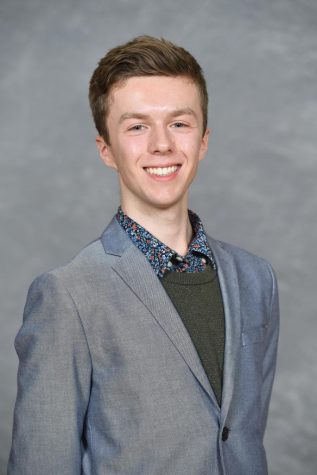Ukrainian students, staff express concerns over Russia tensions
Professor worried over relationship between Russia, Ukraine since 2014 Crimean annexation
Alexander Panchenko, Daniel Lichtchouk and Andrii Zhuravchak all have ties to Ukraine and worry for their relatives and friends still in the country.
February 10, 2022
Ukrainian students and staff at WSU are concerned over tensions between Russia and Ukraine but are hopeful for the future of the country.
Alexander Panchenko
WSU math professor Alexander Panchenko said he emigrated from Kharkiv, Ukraine, to the U.S. in 1993. Kharkiv is a large city approximately 40 kilometers south of the Russia-Ukraine border.
Panchenko has felt worried over the relationship between Russia and Ukraine since 2014 when Russia annexed Crimea, he said. Much of the open warfare during the annexation took place in the Donbas region, about 100 kilometers from Kharkiv.
“They say that they’ll be probably clearing mines out of there for 100 years after the war … So, the devastation is pretty serious,” he said.
Much of Panchenko’s family, like his in-laws, cousins, aunts and uncles, still live in Kharkiv. City officials advised they pack their belongings and be prepared to evacuate, he said. The city also provided a list of nearby bomb shelters.
In 1991, Ukraine held a referendum for independence, which Panchenko voted against. At the time, he felt breaking economic ties with the Soviet Union was a bad idea and would lead to a rise in local elites, he said.
However, after 30 years of Ukrainian independence, he feels differently. Panchenko said Ukrainians are freer now.
“They actually did something good, which was to steer the people toward something better,” Panchenko said.
Daniel Lichtchouk
Daniel Lichtchouk, 21-year-old computer science major, said his parents emigrated from Ukraine in 1997 for economic opportunities.
Much of his family still lives in the capital city of Kyiv and the western part of the country, he said. Growing up, Lichtchouk traveled to Ukraine to visit family for several months in the summers. He last visited in 2017.
Despite his family living far from the Russian border, he is still concerned for their safety, as well as the country’s safety.
Until recently, he never thought about the conflict much, Lichtchouk said. But over the past month, he has grown concerned. He hopes more conflict does not break out, and that Ukraine will be able to join the European Union and gain NATO membership for a better economy and security, he said.
Andrii Zhuravchak
22-year-old Andrii Zhuravchak has lived in Pullman since August 2021. He came to the U.S. from Lviv, Ukraine as a Fulbright student to study computer engineering at WSU, he said.
Lviv is in the western part of the country. While he feels calm regarding Ukraine’s ability to defend itself, Zhuravchak said he is still concerned with how his family and girlfriend, who still live in Ukraine, might be affected economically by a conflict.
Zhuravchak was 14 years old during the Crimean annexation. He said the annexation and war in Donbas was a moment of realization for Ukrainians who never believed Russia would attack the country.
“But it happened, and it was like a moment of shock for everyone. It was hard for the country in general,” Zhuravchak said. “It was a hard moment, a really hard moment.”
People outside Ukraine are very worried about everything happening, but people living in the country have a different perspective, he said. Ukrainians have been living in this reality for eight years now. There is a difference in acceptance, and most people understand conditions cannot immediately change.
“Feelings are really important, but sometimes we just have to talk about reality … If you have war, you have weapons, you have an army, you have to solidify your country around your government, ground your army, and you don’t really talk about your fears or anything,” Zhuravchak said.
For the short term, he hopes the current situation stabilizes. In the future, Zhuravchak said he hopes for a stronger government and country as well as strengthened ties with allied countries.










